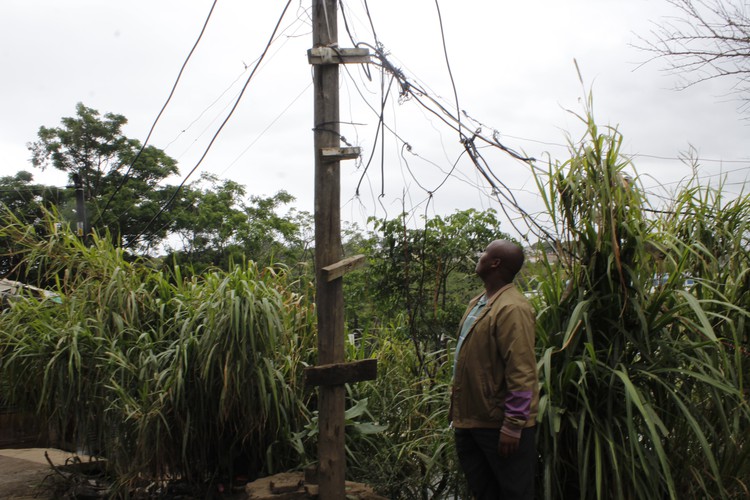
Community leader Mqapheli Bonono points out one of the poles where residents have made illegal connections in order to get electricity. While the municipality has supplied most residents in the settlement with power, a handful were excluded. Photo: Nomfundo Xolo
20 November 2018
Some residents of Foreman Road informal settlement in Clare Estate, Durban are accusing the municipality of sidelining them from an electricity installation project in the area.
This project follows a devastating fire in November 2017 that left over 800 people homeless. The fire occurred days after the municipality had removed the illegal connections in the area, forcing residents to use candles for lighting.
A few months ago, the eThekwini Municipality began installing electricity poles in the area. But a group of residents, including a member of a housing activist group, say they have been excluded from the project without an explanation from officials.
On Monday, resident and chairperson of Abahlali BaseMjondolo in KwaZulu-Natal, Mqapheli Bonono, said that his shack was among a handful of houses that did not receive electricity. He showed GroundUp how several shacks surrounding his home had been connected, Bonono said when he questioned officials about it, he was given “different excuses”.
He believes his exclusion is because of his work with Abahlali. “They [the municipality] know who were in the forefront during the protests and who are the loudest speakers in meetings. We challenge them and they see us as a threat. So they are now punishing us.”
Another resident, Thandazile Zulu, 41, has lived in Foreman Road for 20 years. She too has been left out of the project without an explanation. She said that the electricity was a “political front” to reward members of the ruling party.
“I live with my four children in a one-room shack and I am unemployed. Don’t I deserve the same human rights as my neighbours? Maybe I am not poor or ANC enough,” she said.
Households like Bonono’s and Zulu’s have since connected their homes to the electricity poles illegally. Zulu said the illegal connections were not safe and often left them in the dark during strong winds and rain. She said sometimes the wires fell to the ground when it was windy. “On those nights I have no choice but to ask my neighbours to help prepare meals,” she said.
Lindiswa Mhlanga, whose shack did get electricity, said while this was costly, her family felt much safer. “Having electricity connected to my house gave me peace of mind. I can even go outside and hang washing without worrying if my child could be electrocuted,” she said.
Asked why some residents had been excluded, ward councillor Mohammed Haniff said the project had been brought to a halt a few months ago after the contractors said they felt unsafe. He said the project was meant to be completed in October.
“The municipality’s contractors say they feel threatened. They will not continue to work until safety measures are put into place,” he said.
Haniff said that during at a meeting with members of Abahlali, the ward committee and the electricity department in September, the community had been asked to ensure that workers would be safe. He said the remaining households would be serviced once the safety of the workers could be guaranteed.
But Bonono said they were not aware of this agreement and were waiting for their electricity to be installed.